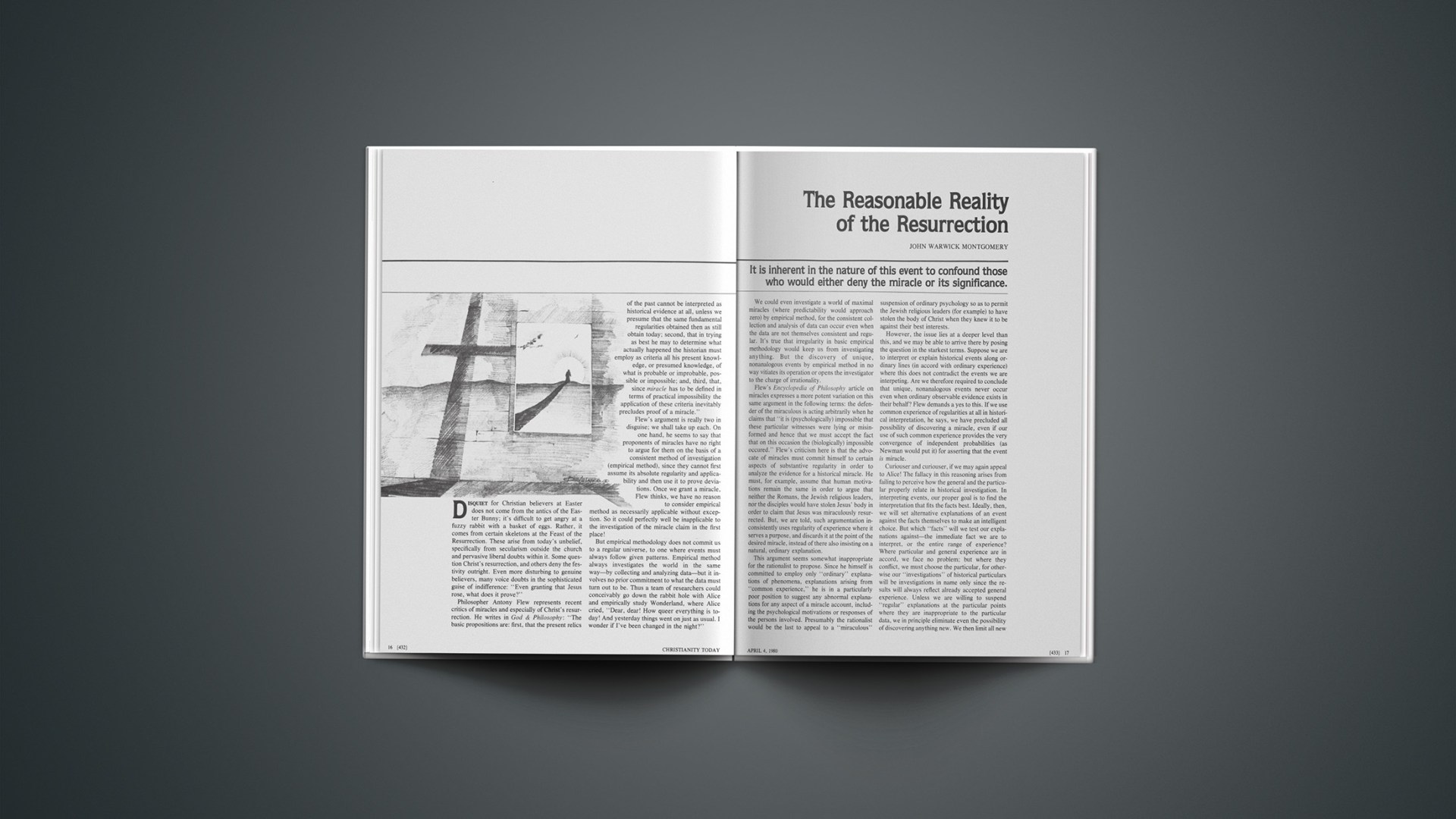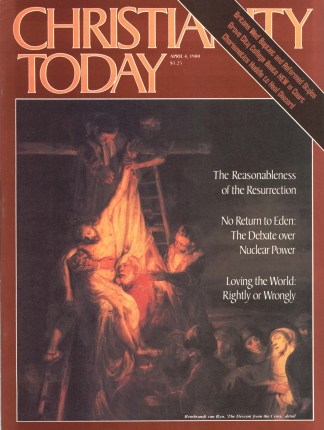It is inherent in the nature of this event to confound those who would either deny the miracle or its significance.
Disquiet for Christian believers at Easter does not come from the antics of the Easter Bunny; it’s difficult to get angry at a fuzzy rabbit with a basket of eggs. Rather, it comes from certain skeletons at the Feast of the Resurrection. These arise from today’s unbelief, specifically from secularism outside the church and pervasive liberal doubts within it. Some question Christ’s resurrection, and others deny the festivity outright. Even more disturbing to genuine believers, many voice doubts in the sophisticated guise of indifference: “Even granting that Jesus rose, what does it prove?”
Philosopher Antony Flew represents recent critics of miracles and especially of Christ’s resurrection. He writes in God & Philosophy: “The basic propositions are: first, that the present relics of the past cannot be interpreted as historical evidence at all, unless we presume that the same fundamental regularities obtained then as still obtain today; second, that in trying as best he may to determine what actually happened the historian must employ as criteria all his present knowledge, or presumed knowledge, of what is probable or improbable, possible or impossible; and, third, that, since miracle has to be defined in terms of practical impossibility the application of these criteria inevitably precludes proof of a miracle.”
Flew’s argument is really two in disguise; we shall take up each. On one hand, he seems to say that proponents of miracles have no right to argue for them on the basis of a consistent method of investigation (empirical method), since they cannot first assume its absolute regularity and applicability and then use it to prove deviations. Once we grant a miracle, Flew thinks, we have no reason to consider empirical method as necessarily applicable without exception. So it could perfectly well be inapplicable to the investigation of the miracle claim in the first place!
But empirical methodology does not commit us to a regular universe, to one where events must always follow given patterns. Empirical method always investigates the world in the same way—by collecting and analyzing data—but it involves no prior commitment to what the data must turn out to be. Thus a team of researchers could conceivably go down the rabbit hole with Alice and empirically study Wonderland, where Alice cried, “Dear, dear! How queer everything is today! And yesterday things went on just as usual. I wonder if I’ve been changed in the night?”
We could even investigate a world of maximal miracles (where predictability would approach zero) by empirical method, for the consistent collection and analysis of data can occur even when the data are not themselves consistent and regular. It’s true that irregularity in basic empirical methodology would keep us from investigating anything. But the discovery of unique, nonanalogous events by empirical method in no way vitiates its operation or opens the investigator to the charge of irrationality.
Flew’s Encyclopedia of Philosophy article on miracles expresses a more potent variation on this same argument in the following terms: the defender of the miraculous is acting arbitrarily when he claims that “it is (psychologically) impossible that these particular witnesses were lying or misinformed and hence that we must accept the fact that on this occasion the (biologically) impossible occured.” Flew’s criticism here is that the advocate of miracles must commit himself to certain aspects of substantive regularity in order to analyze the evidence for a historical miracle. He must, for example, assume that human motivations remain the same in order to argue that neither the Romans, the Jewish religious leaders, nor the disciples would have stolen Jesus’ body in order to claim that Jesus was miraculously resurrected. But, we are told, such argumentation inconsistently uses regularity of experience where it serves a purpose, and discards it at the point of the desired miracle, instead of there also insisting on a natural, ordinary explanation.
This argument seems somewhat inappropriate for the rationalist to propose. Since he himself is committed to employ only “ordinary” explanations of phenomena, explanations arising from “common experience,” he is in a particularly poor position to suggest any abnormal explanations for any aspect of a miracle account, including the psychological motivations or responses of the persons involved. Presumably the rationalist would be the last to appeal to a “miraculous” suspension of ordinary psychology so as to permit the Jewish religious leaders (for example) to have stolen the body of Christ when they knew it to be against their best interests.
However, the issue lies at a deeper level than this, and we may be able to arrive there by posing the question in the starkest terms. Suppose we are to interpret or explain historical events along ordinary lines (in accord with ordinary experience) where this does not contradict the events we are interpeting. Are we therefore required to conclude that unique, nonanalogous events never occur even when ordinary observable evidence exists in their behalf? Flew demands a yes to this. If we use common experience of regularities at all in historical interpretation, he says, we have precluded all possibility of discovering a miracle, even if our use of such common experience provides the very convergence of independent probabilities (as Newman would put it) for asserting that the event is miracle.
Curiouser and curiouser, if we may again appeal to Alice! The fallacy in this reasoning arises from failing to perceive how the general and the particular properly relate in historical investigation. In interpreting events, our proper goal is to find the interpretation that fits the facts best. Ideally, then, we will set alternative explanations of an event against the facts themselves to make an intelligent choice. But which “facts” will we test our explanations against—the immediate fact we are to interpret, or the entire range of experience? Where particular and general experience are in accord, we face no problem; but where they conflict, we must choose the particular, for otherwise our “investigations” of historical particulars will be investigations in name only since the results will always reflect already accepted general experience. Unless we are willing to suspend “regular” explanations at the particular points where they are inappropriate to the particular data, we in principle eliminate even the possibility of discovering anything new. We then limit all new (particular) knowledge to the sphere of already accepted (general) knowledge.
The proper approach is just the opposite: the particular must triumph over the general, even when the general has given us immense help in understanding the particular.
How does a historian properly determine what has occurred, and interpret it? Admittedly, he takes to a study of any particular event his fund of general, “usual” experience. He relies upon it wherever it serves a useful function and not because he has any eternal, metaphysical justification for doing so. But the moment the general runs into tension with the particular, the general must yield for two reasons. First, the historian’s knowledge of the general is never complete, so he can never be sure he ought to rule out an event or an interpretation simply because it is new to him. Second, he must always guard against obliterating the uniqueness of individual historical events by forcing them into a Procrustean bed of regular, general patterns. Only the primary source evidence for an event can ultimately determine whether it occurred or not, and only that same evidence will establish the proper interpretation of the event.
Thus, in the argument for Christ’s resurrection, nothing in the primary documents forces the historian to miraculous explanations of motives or actions of the Romans, the Jewish religious leaders, or the disciples. Indeed, the documents show them to have acted with exemplary normality, as typically sinful and insensitive members of a fallen race. But these same primary documents do force us to a miraculous understanding of the resurrection, since any other explanation runs directly counter to all of the primary-source facts at our disposal. The documents, in short, force us to go against biological generalizations as to corpses remaining dead, but do not require us to deviate from psychological generalizations as to behavior of individuals and crowds. Contrary to what Flew imagines, we do not arbitrarily prefer biological miracles over psychological miracles; we accept no miracles unless the primary evidence compels us to it: if in fact that evidence required psychological miracles rather than biological ones, we would go that route.
French Judge Jacques Batigne describes a bizarre case in which a corrupt magistrate’s clerk, in the face of overwhelming scientific proof of his guilt, stubbornly maintained his innocence for almost a year, even when he knew it was unquestionably in his best interest to come clean. Those involved in the case were so impressed by the clerk’s fine past record and sincerity that they did everything possible to believe that a “physical miracle” accounted for the evidence against him, but the facts finally brought them to conclude the “miracle” was psychological: the clerk inexplicably preferred to act against his own interest.
The gospel narratives give us no such situation. They force a biological miracle upon us, like it or not. The primary facts, and those facts alone, can arbitrate such questions; generalizations, though helpful to us in reaching the point of primary investigation, must bow to the facts revealed there.
Secularists are also heard to argue today that a proven miracle, even the miracle of Christ’s resurrection, would be vacuous, for it still would not require belief in God. This viewpoint is held by those opposing miracles, but even a philosopher such as M. A. Boden, who is at pains to show their epistemological meaningfulness, makes the assertion in the December 1969 issue of Ratio: “The fact that theological underpinnings are necessary to the very identification of a miracle in the first place is, of course, one reason why miracles could never be regarded as a proof of the existence of some god or God to an unbeliever who was aware of the various different super-rational powers which could in principle be invoked as explanations of scientifically anomalous events.”
Often the claim that “miracles can’t prove God” is little more than a variation on Lessing’s theme that “the accidental truths of history can never become the proof of necessary truths of reason.” Insofar as the argument proceeds in this fashion, we can easily dispose of it, for Lessing confused what contemporary analytical philosophers term the “synthetic” (factual) and the “analytic” (purely formal) areas of assertion. Only in the analytic realm are “necessary truths” possible—truths about which we can be 100 percent certain. Synthetic evidence, involving probabilities and plausibilities, can never rise to such a level of proof.
God-statements do not fall into the analytic realm, unless by “God” we mean only a formal assertion of deductive logic or pure mathematics! However, if by “God” we mean an existent, factual being, then any proof of his existence or statement about him must lie in the realm of the synthetic; that is, it must be factual.
So only “the accidental truths” of historical experience are ever capable of becoming the proof of God’s existence! Granted, the proof will never reach 100 percent (faith will have to jump the gap from plausibility to certainty), but such proof is the basis of all our factual decisions in life, so we cannot summarily dismiss it just because a vital religious question is at issue. Thus Jesus was quite willing to use his miraculous healing of the paralytic to demonstrate (not to analytic certainty but with synthetic persuasiveness) that he could forgive sins and was therefore truly divine (Mark 2:1–12).
But how persuasive is such a miraculous demonstration, after all? If I were to grow hair on a billiard ball, would I be justified in claiming deity? Hardly, and likewise the significance of a miracle does not depend in the final analysis on the degree to which it “violates natural law” (whatever that means, and I doubt that it can mean much in the age of Einstein). Rather, the significance depends on the character of the miracle, on whether it speaks to universal human need.
Even an event that allows for the full range of secondary causes to explain it can have significant miraculous impact if it operates at the point of man’s existential need. In the January 1965 issue of American Philosophical Quarterly, R. F. Holland offers this example: an express train suddenly stops just before striking a child on the railroad track. Why? Because the engineer has a sudden heart attack as a result of an argument with a colleague. Holland perceptively comments on the “coincidence” or “contingency” miracle:
“Unlike the coincidence between the rise of the Ming dynasty and the arrival of the dynasty of Lancaster, the coincidence of the child’s presence on the line with the arrival and then the stopping of the train is impressive, significant; not because it is very unusual for trains to be halted in the way this one was, but because the life of a child was imperiled and then, against expectation, preserved. The significance of some coincidences as opposed to others arises from their relation to human needs and hopes and fears, their effects for good or ill upon our lives. So we speak of our luck (fortune, fate, etc.). And the kind of thing that, outside religion, we call luck is in religious parlance the grace of God or a miracle of God. But while the reference here is the same, the meaning is different. The meaning is different in that whatever happens by God’s grace or by a miracle is something for which God is thanked or thankable, something which has been or could have been prayed for, something which can be regarded with awe and be taken as a sign or made the subject of a vow (e.g., to go on a pilgrimage).”
When we turn to the unique, nonanalogous event of the resurrection Jesus and classical Christian apologists used to attest the claim that “God was in Christ, reconciling the world unto himself” (2 Cor. 5:19), we find a compelling reason to bring God into the picture: this miracle deals effectively with the most fundamental area of man’s universal need, the conquest of death. Not just a single child is saved from a railway accident; rather, the entire race is freed from death by Jesus’ act and consequent promise that “whoever lives and believes in me shall never die” (John 11:26) and “because I live, you will live also” (John 14:19).
Philosopher Paul Dietl correctly observes in the April 1968 issue of the American Philosophical Quarterly that “to prove the existence of a being who deserves some of the predicates ‘God’ normally gets would be to go some way toward proving the existence of God” and “when and for whom He did miracles would be evidence as to His character.” This is precisely why the resurrection has led so many to affirm the deity of Jesus, and why we may properly infer his deity from his resurrection. The conquest of death for all men is the very predicate of deity that a race dead in trespasses and sins can most clearly recogize, for it meets man’s most basic existential need to transcend the meaninglessness of finite existence. Not to worship One who gives us the gift of eternal life is hopelessly to misread what the gift tells us about the Giver. No more worthy candidate for deity is in principle imaginable than the One who conquers death on mankind’s behalf.
The gospel events, if they can in fact be shown to have occurred, require an answer to Jesus’ straightforward question, “But who do you say that I am?” (Matt. 16:15). Now, as then, only one answer will fit the facts.
And we should note that once we have granted the factual character of Christ’s resurrection, all explanations for it reduce to two: Christ’s own (he rose because he was God) and every interpretation of the event contradicting this explanation. Surely it is not difficult to make a choice here, for Jesus (unlike anyone else offering an explanation of the resurrection) actually arose from the dead! His explanation has prima facie value as opposed to those in contradiction to it, presented as they are by persons who have not managed resurrections themselves.
The very fact that a miracle is a nonanalogous event offers an even greater reason than ordinarily to let it interpret itself, to seek its interpretation within itself. What other event or interpreter, after all, could help us understand it? But when we do go to the One who personally experienced the resurrection, all gratuitous interpretations of the chariot-of-the-gods, creature-from-outer-space variety evaporate in the light of his own affirmation of his divine character, to which the sign of Jonah unequivocally points.
Carl F. H. Henry, first editor of Christianity Today, is lecturer at large for World Vision International. An author of many books, he lives in Arlington, Virginia.










